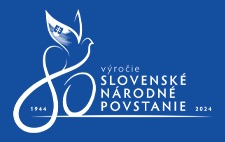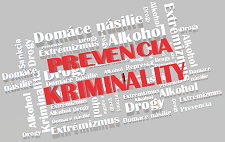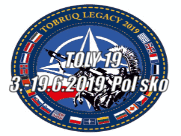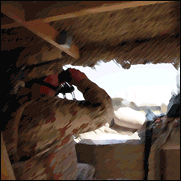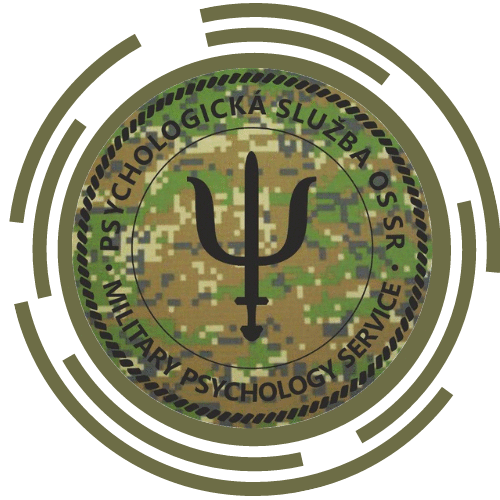AT EASE 2024
The International English Language Conference AT EASE
held on 3 – 5 June, 2024 in Liptovský Mikuláš, Slovakia
The aim of the conference was to share knowledge, ideas and experience among professionals working with adult English learners – military personnel.
Monday 3rd June 2024
Welcoming speech was given by SVK LI Director - Lieutenant Colonel Matúš Šostronek, followed by Military Academy Rector´s speech - BG. Aurel Sabó, Rector of SAFA.
Administrative brief was given by Captain Martin Sekan. He informed the audience about security rules and the program of the upcoming days.
Lieutenant Colonel Matúš Šostronek, gave his presentation about history, structure and future plans of the Language Institute in Liptovský Mikuláš and its detached departments located in towns: Trenčín, Zvolen, Prešov, Nitra and Martin.
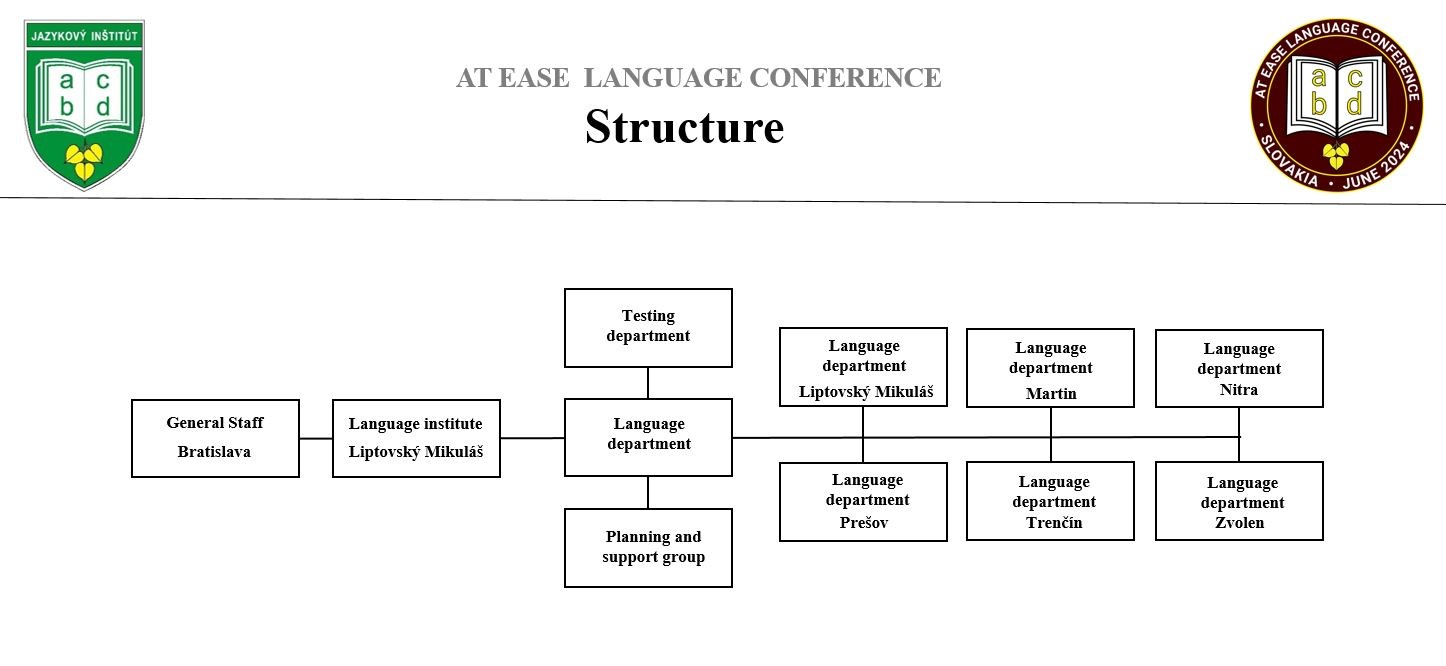
The first day of the conference was filled with presentations given by PRESENTERS:
-
Lt. Col. Ing. Matús Šostronek, SVK DLI Director, Liptovský Mikuláš, Slovakia
-
PaedDr. Judita Tothová, ELT Consultant, Ventures Books, Nitra, Slovakia
-
Mgr. Daniela Myjavec, PhD., Constantine the Philosopher University, Nitra, Slovakia
-
Dr. Gabriella Kiss, Dr. PhD - Director of Foreign Language Training Centre of the Faculty of Military Sciences and Officers’ Training, Ludovika – University of Public Service, Budapest, Hungary
PaedDr. Judita Tothová, ELT Consultant, Ventures Books, Nitra, Slovakia Interactive tools in teaching
The best learning outcomes happen when the learning is interactive and the students are involved in it. In her presentation, Mrs. Tothová, focused on new digital tools to support all teaching and learning scenarios: in-class, remote ad hybrid. The aim of the presented interactive tools is to deliver all in one place without logging into multiple tools.
focused on new digital tools to support all teaching and learning scenarios: in-class, remote ad hybrid. The aim of the presented interactive tools is to deliver all in one place without logging into multiple tools.
Besides learning about main functionalities of the interactive materials (student's book, workbook, gradebook, virtual classroom and test generator) the audience was given the opportunity to try out a demo version and have a look at practical usage of Pearson English Connect and courses available on this platform. The presented tools support teaching in every learning environment, both in-class on Interactive White Boards, during face-to-face learning or via videoconferencing tools in online courses. All the demonstrated programs deliver personalized, flexible instruction to engage and motivate students and help teacher to keep track of students’ progress and enhance the learning experience.
Mgr. Daniela Myjavec, PhD., Constatntine the Philosopher University, Nitra, Slovakia
Improve your presentation skills by practising mindfulness techniques
Improve your presentation skills by practicing mindfulness techniques was presented by Daniela Myjavec from Constantine the Philosopher University in Nitra. She developed the ideas how to improve both teachers’ and students’ performance through implementing mindfulness techniques. First, the presenter talked about the techniques how to ease the stress before giving a presentation such as different breathing exercises, practicing in front of mirror or collecting ideas to talk about in your presentation. One of the most memorable ways to release the stress mentioned in the talk was screaming out of the window. The second part of the presentation was focused on how to make the presentation engaging for the listeners. We would like to highlight especially the communication with the audience, which includes not only observing, but also listening to what they have to say. Another interesting point was including a personal narrative to connect with the audience. 
Here the presenter mentioned Pixar storytelling technique which would definitely be worth exploring more in the future. Being a teacher means to stand and talk in front of students on everyday basis, which is not always an easy job. Therefore, we appreciate such presentations which boost our confidence as teachers.
Dr. Gabriella Kiss, University of Public Service, Budapest, Hungary Call for Shift in Language Education
Dr. Gabriella gave a lecture on topic – Call for Shift in Language Education which was subsequ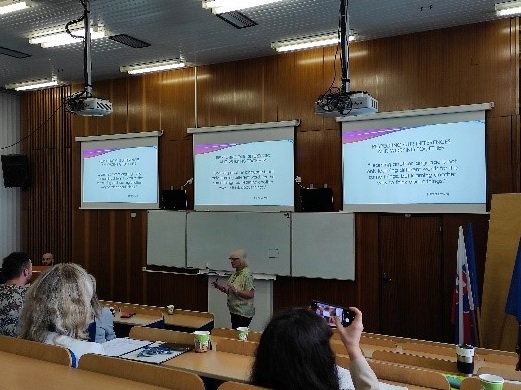
ently followed by a workshop with the same title.
“We have to learn how to unlearn to relearn.“
In her presentation, Dr. Gabriella Kiss, focused the audience's attention and gave her thoughts on new challenges in English language learning (both in the field of general and military English). Together with her audience, she sought to define new objectives in language education, creative learning and teaching programme, or how to approach the Gen – Z (later Gen-Alpha) population. Gen Z (born between 1997 and 2012) is notable for being the first generation to be totally immersed in the world of the internet since birth. Generation Alpha (born between 20210/12 and 2025) is shaped by omnipresent technology and COVID-19 pandemic in their formative years.
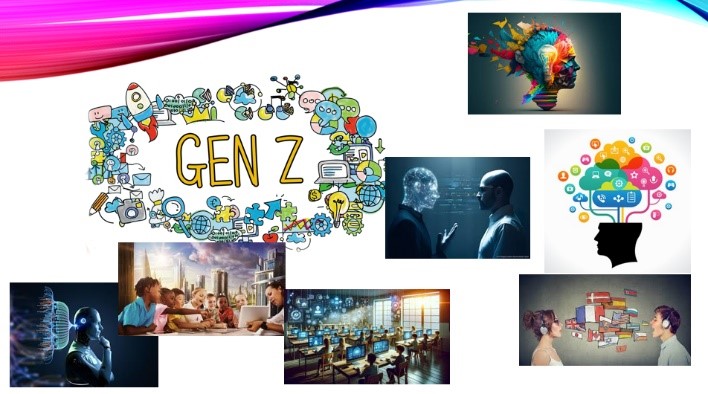
The lecture also prompted questions of whether technology is the new solution. The emphasis was placed on lifelong learning which is nowadays even more true. Dr. Kiss later introduced Pyramid of Educational Elements. She presented necessary steps in building coalition such as tailored educational programmes, supporting unit-educators by mentor-teacher programme, refreshing courses as well as exchange programmes or regular contact with MoD/HDF representatives. Significant role was placed also on newly designed studying materials, supplementary materials and tests. The talk was closed on a note of urgent need of shifting approach, attitude and mind set on all sides. Everyone matters. There is hope and clear perception of common success.
Tuesday 4th June 2024
The second day of the conference was filled with presentations given by PRESENTERS:
-
Jurgen Kotzian, The Austrian Armed Forces, Austria
-
Mgr. Jana Chovancova, DLI, Slovakia
-
Ibrahim Ghanwi, MOD, Slovakia
The second day of the conference started with presentation by Jurgen Kotzian (The Austrian Armed Forces) with presentation about Teaching General English vs. Teaching ESP
Mr. Kotzian started his presentation outlining the system of teaching general English in the Austrian army.
The conference participants in three groups then came up with the characteristics of EGP vs. ESP. The ideas were shared and compared with the official definitions.
He then followed with information regarding teaching ESP in the Austrian military, namely the initial stage of designing an ESP course, the subject matter experts (i.e. teachers and experts delivering the content), and the threshold level required to take part in an ESP course (No ESP without EGP rule). He also talked about the main challenges being the resources (available materials) and personnel (who is able to teach ESP).
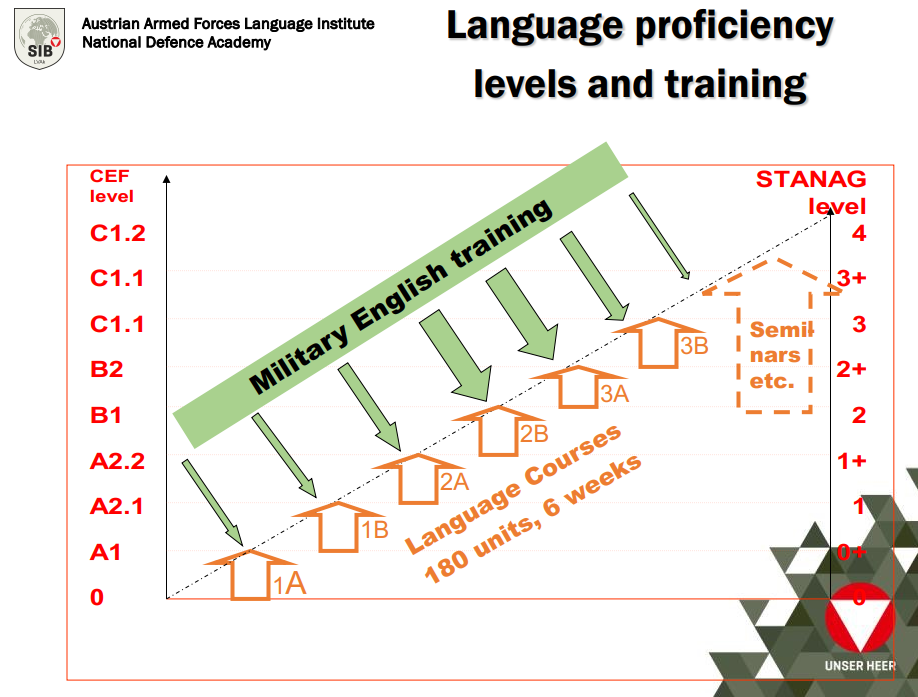
Participants shared their own experiences and challenges.
Another topic presented by Mgr. Jana Chovancová – The Language Institute, Liptovský Mikuláš, Slovakia, was about Motivation in Teaching Adults for ESP.
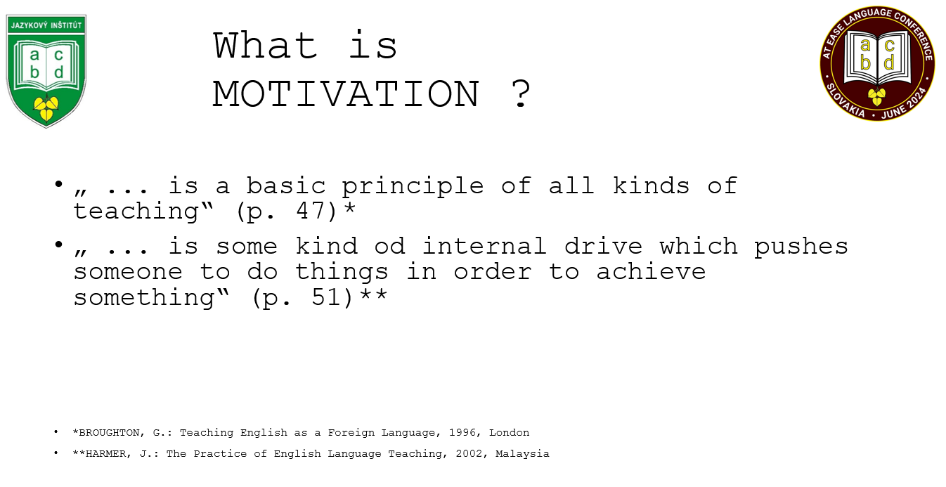 Mrs. Chovancová presented a theoretical background outlining the basic types of motivation. She continued talking about motivation in more detail, focusing on motivation in adult learners in the military environment. She stressed that a motivated teacher is equally important to help students to achieve good results and enjoy the learning process.
Mrs. Chovancová presented a theoretical background outlining the basic types of motivation. She continued talking about motivation in more detail, focusing on motivation in adult learners in the military environment. She stressed that a motivated teacher is equally important to help students to achieve good results and enjoy the learning process.
Influence of Testing on Teaching presented by Ibrahim Ghanwi
Mr. Ghanwi started by stating that “understanding testing determines the way we teach”. He talked in detail about the challenges faced by teachers and students alike with regards to tests and results. He highlighted differences between teaching and teaching for testing. He outlined the basic principles of teaching foreign languages in ten steps. He gave recommendations for teachers when teaching reading and listening skills.

Wednesday 5th June 2024
The third day of the conference continued with presentations given by PRESENTERS:
-
Mgr. Ilona Šostroneková, Linguist, Slovakia
-
Claudia Molnar, MM publishing, Hungary
-
Mgr. Ivana Kližanová, DLI, Slovakia
-
David Brent Griffin, PhD., Canada
-
Ms. Reka Kocsis, LUPS, Hungary
Workshop – Well-being with Neuro-language coaching led by Mgr. Ilona Šostroneková, Slovakia 
Mrs. Šostroneková briefly talked about what NLC can help us to deal with. She explained the difference between NLP (neuro-language programming) and NLC (the question from a participant). She then followed by talking about giving FD and accepting it amongst teachers and why that could be difficult for many. There was a demonstration of a session with a client (an audience volunteer) who wants to learn a language and is having a difficulty in achieving this goal.
Skills Building for Communication, Workshop led by Claudia Molnar, MM publishing, Hungary

Mrs. Molnar talked about research-based and problem-based learning and their application in teaching speaking. She stressed the importance of being interested in students, their needs and lives and to show them that you really care. Another topic that she covered was new generations that we now teach and the importance of being aware of language they use and how they are different to the previous generations, as this has a direct impact on how we need to teach them. She gave numerous good tips, ideas and recommended books to the participants.
Role plays with a twist – workshop on how to experience real language through role-plays. Presented and guided by Mgr. Ivana Kližanová, DLI, Slovakia.
A very refreshing presentation reminding teachers of the benefits of using role plays in the classroom – even with students at different levels
 Role plays help students learn useful functional language and practice speaking in real-life situations as well as come up with impromptu responses to various unexpected situations. The presenter suggested modifications and tactics for using textbook role plays in a more interesting and challenging way. It gave us a new perspective on using - sometimes a bit monotonous - textbook role plays in a different, more efficient way.
Role plays help students learn useful functional language and practice speaking in real-life situations as well as come up with impromptu responses to various unexpected situations. The presenter suggested modifications and tactics for using textbook role plays in a more interesting and challenging way. It gave us a new perspective on using - sometimes a bit monotonous - textbook role plays in a different, more efficient way.
A follow-up workshop giving teachers an opportunity to suggest military scenarios for role plays that could be used in STANAG courses would be a nice idea.
Activities to get students talking – workshop on how to engage students in English Speaking Classes. Presented and guided by David Brent Griffin, PhD., Canada
This workshop nicely summarised a variety of activities that can be used as ice breakers, warm-ups or speaking ‘enhancers’ using ordinary, sometimes funny or awkward, everyday objects.
It inspired us to consider thinking outside the box even in the classroom environment and not just rely on the well-established and overused tasks, exercises, role plays and scenarios.
Low-tech rules. Workshop guided by Ms. Reka KOCSIS, LUPS, Hungary
Presentation giving an insight into how to use classic, simple, well-established activities, not requiring a lengthy preparation, in the military environment without using the ever-present modern technology devices
Reminder of the good old times when using just a single sheet of paper teachers were able to teach and also entertain students in a dynamic and thought-provoking way – making use of the competitive element /dividing students into teams, awarding points for the correct answers.
Disclaimer: All above mentioned information is property of the individual presenters and Defense Language Institute of Slovak Armed Forces (DLI SAF). For further distribution please contact representatives of DLI SAF.


